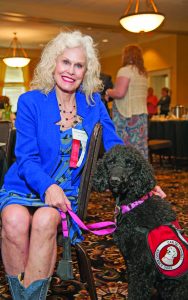John Gessner – June 8, 2017 – (Sun ThisWeek) –
Burnsville resident, new partner graduate from training.
Now on her second assistance dog, Kimberly Hodges still marvels at what the highly trained animals can do.
“It is so fascinating to watch these guys work,” the 67-year-old Burnsville resident said. “They’re just amazing. They can do everything but cook dinner and put the dishes away.”
Hodges, who has multiple sclerosis, uses her dog to steady her gait and help her keep her balance when she walks. The dog opens and closes Hodges’ cupboards and refrigerator, which have tug fixtures on them.
The dog fetches Hodges’ shoes and would be taught to get the phone if she had a land line.
“But I only have my cell, and I’m scared she’ll eat it or bite through it,” Hodges said.
She and her new partner — a 2-year-old standard poodle named Shirley — are among more than 15 teams graduating from assistance dog training at Can Do Canines in New Hope. The organization, which provides free assistance dogs to qualifying people with disabilities, is holding a graduation ceremony Saturday, June 10, at 1 p.m.
Hodges brought Shirley home to her condo, where she lives alone, about six weeks ago.
“We are still in a learning curve,” Hodges said. “The problem with a poodle is they’re so smart, the second-smartest dog behind a border collie. Whatever she can get out of, sometimes she will test me a lot, and we have to have some conversations. But she’s pretty good. We get along pretty well, I would say.”
Hodges was working as a purchasing manager in Minneapolis 20 years ago when she learned of her disease in a lunch-hour doctor’s appointment.
Hodges was due back at work for a meeting, but her career effectively ended that day.
“They were hoping I had Lyme disease,” Hodges said. “So my doctor told me I had MS. I said, ‘I have to go to get back to work.’ And I turned around and collapsed. So, yeah, it was kind of a shock.”
The disease, while slow to progress in her case, has left her right leg, arm and foot very weak, said Hodges, who wears a leg brace. She’s mobile, but balance is a problem.
About eight years ago a friend in Bible study told Hodges about assistance dogs. She looked online and found Can Do Canines, which provides dogs free to people with disabilities including diabetes, seizure responses, hearing loss, mobility challenges and autism.
Hodges completed the application — which included a doctor’s endorsement — and was paired with Bishop, a smooth-coated collie.
Dogs from Can Do Canines start their training as puppies with basic obedience and early assistance skills, in the homes of volunteers or in one of six prisons in Minnesota and Wisconsin. After 18 months they’re returned to the organization for more training.
Dog-partner matches are based on the dog’s size and skills and the person’s needs, Hodges said. The partners train together — including going out in public to see how the dog behaves — before a match is finalized, she said. After a year with the dog, the partner becomes the owner, she said.
“It costs a lot of money to train these dogs,” Hodges said.
She got Bishop in 2009 and had him for six years.
“But he had to retire because he got arthritis and had trouble getting in and out of the car and being on his feet for very long,” said Hodges, who sent Bishop to live with a friend.
“Yes, I miss him terribly,” she said. “But I get to go see him.”
Hodges lived in Florida for a year and a half after Bishop retired but returned to Minnesota to be near doctors and family. She immediately applied for another assistance dog.
“Because I had one previously, I didn’t have to go to the back of the line, which is like 181 people,” she said.
Shirley, whose duties include pushing heavy handicap-access buttons to open doors, wears a halti harness with a handle affixed that Hodges grips when she walks.
“She walks right next to me,” Hodges said. “If I start going over to one side, she’ll kind of push me to the other side, and I just hold onto her and she steadies my gait.”
“Instead of holding onto a cane or a walker,” she said, “I have a dog.”




